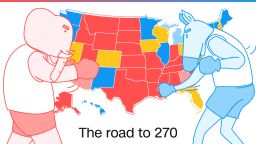Story highlights
Desperate for cash, Trump is largely charting his own course
Republican financial establishment is still largely declining to fund Trump's political hopes
Two scenes of wealth unfolded in this Republican bastion this weekend.
One starred Donald Trump, who spent a little less than an hour on Friday regaling hundreds of donors and personal friends at a private home with a helipad, multiple swimming pools and a picturesque overlook of sandstone formations that impressed those who ponied up $25,000 for VIP treatment.
The other starred Charles Koch, who, despite the mountain vistas and man-made lakes at a lavish five-star resort here, painted a dark picture of the world, warning his own frustrated network of donors that no politician – even Trump, a few miles away – is the savior that some of them think.

Trump was here to meet donors. Koch to make clear that he would not be one of them.
The coincidental split-screen moment highlighted the herculean task before Trump with now less than 100 days to go in the general election: Desperate for cash, Trump is largely charting his own course, snubbed by traditional Republican donors with the clock winding down for him to finally win them over.
The Republican financial establishment, so enchanted by Mitt Romney four years ago, is still largely declining to fund Trump’s political hopes. Frustrated by unforced controversies like this weekend’s criticism of the parents of a Muslim soldier, GOP elites feel little rush to help save the campaign that for the first year of its existence bashed donors as corrupt puppeteers.
Yet allies and foes alike note that Trump is making unmistakable progress, converting cold donors into lukewarm supporters – or even turning them so passionate that they would challenge the Koch Brothers themselves.
Hillary Clinton and her groups have massively outraised Trump and his in recent months, though Trump has scaled up his fundraising infrastructure in recent months to narrow the gap. And Trump has voiced deep skepticism of television ads, bloated staffing and data investment, insisting that he can run a campaign on the cheap.
The main thing working against Trump: time. If he does not raise cash quickly enough, Republicans worry Trump could face unprecedented disadvantages in field organization and advertising that would effectively create a one-sided battle in some swing states.
“There’s been a lot of green shoots of progress with the major donor community,” said Phil Musser, a Republican strategist who advises top moneymen and has helped guide Mike Pence in the fundraising world. Musser said that his donors are loosening up now that they believe Trump has a plausible path to victory.
“That might not be popular to say, but major donors tend to be the most sophisticated political animals in our party,” Musser said.
It’s a message the Trump campaign has been pushing. Trump aides last week were sharing internal polling with donors that showed him up five to seven points after the Republican National Convention, according to a person briefed on the conversations. The campaign argued to its donors that Clinton would need her own counter-bump of five points to remain competitive.
And the campaign is also now blessed with new able bodies who can fundraise in the place of the less-than-eager billionaire. Trump’s three oldest children are kicking off a finance event calendar that is close to on par with the schedule undertaken by Trump himself, according to a senior Trump fundraiser involved in the planning. The poised trio is expected to spend the next ten weeks headlining three or four events each, which Trump allies hope can raise between $30 and $40 million for the cash-strapped campaign.
The campaign did not comment on the polling or the schedule of Trump’s children.
“You cannot imagine how many Donald skeptics have come up to me post-convention to say something like: ‘There is one thing a candidate can’t fake and that is his offspring’,” said Wilbur Ross, a New York billionaire who is one of his top fundraisers. “There still are lots of naysayers, but fewer every day.”
Another key fundraiser: Pence, Trump’s running mate whose broad relationships with the party’s donors – including the Kochs – is predicted to slightly loosen some doors that were previously shut solid. The Indiana governor was originally scheduled to woo the Kochs here this weekend, but suddenly canceled when named to the ticket.
“A lot of people that wouldn’t have voted for Trump before will now because of Pence,” said Fred Klipsch, a Koch donor who was the treasurer of Pence’s now-dropped reelection bid for governor..
Donors remain divided
And two nagging concerns about Trump’s donor operation have also been put to rest in recent weeks: His small-dollar program has surpassed senior Republicans’ expectations, flooding Trump with cash that he himself doesn’t have to work for. And at last month’s Republican National Convention, one of the Trump super PACs finally showed sufficient signs of life to convince many Trump-friendly donors that they have a place to park their large checks.
Get ready: The election is less than 100 days away
But if Trump is to collect enough seven-figure checks, he’ll have to expand beyond his network of personal business associates and friends who so far have constituted a disproportionate part of the Trump finance operation. There are only sputtering signs he’s doing so.

Trump talk overshadowed the entire weekend here at the base of Pike’s Peak, with several donors, like Texas scion Doug Deason, saying that they confronted Koch leadership about the network’s unwillingness to back the GOP nominee. It was unclear if the resistance to Trump at Koch was anything more than a vocal minority, though the head of the Koch political operation, Mark Holden, did not dispute to CNN that the Kochs had seen a backlash.
It also put some of the Trump backers in awkward position.
“I can respect their point of view,” Gov. Scott Walker, a Koch favorite and an ousted Trump rival, told CNN. “They’re not about being political kingmakers. They’re about setting a long-term goal.”
Yet majorities of the 400 Koch donors who roamed the Broadmoor Hotel this week told CNN that they were comfortable with their network’s decision to concentrate on Senate races and not line up behind Trump. And of the 100 or so most generous donors in the two most recent election cycle, dozens are still refusing to endorse him, including Paul Singer, Ken Griffin – and Charles and David Koch.
“I am etching closer,” said L.E. Simmons, who was a national finance chair of Mitt Romney’s 2012 bid and this year supported Marco Rubio in the primaries, “but no major decisions.”
And even if some former anti-Trump donors are now at peace with the nominee, few are actively helping him. A high-dollar fundraiser on the scene here predicted that a “substantial majority” of the top 500 donors in the country were still on the sidelines.
Hillary Clinton targets Trump’s Rust Belt base
Warren and Jackson Stephens, for instance, who have given over $14 million this cycle – much of which was used to slaughter Trump during the primary season – are still not supporting him in the fall, according to a person familiar with the Arkansas brothers’ thinking.
Nor is Rex Sinquefeld, the top political donor in Missouri and one of the biggest contributors to the Republican National Committee. Nor is John Nau, the Houston beer distributor and a major benefactor of American Crossroads, according to an aide. And nor is fellow Houston bigwig, home builder Dick Weekley, an aide said, instead turning inward to Texas politics.
Some other givers have indicated they though they would not back Trump, they would give to support anti-Clinton spending. Yet that’s something the Kochs ruled out this weekend.
And a large number of Republicans fall into an unknown category, estimated to be as much as one-third of major givers: Those who keep quiet. Many Republican donors – including wide swaths of those who came to the Broadmoor – have not put on record their position on Trump with a statement or a donation, a reluctance that signals just how divisive he is within the donor community.
Aides to several other top 20 Republican donors – from Texans owner Bob McNair to media magnate Jerry Perenchio to Koch funder J.W. Childs – did not respond to requests this weekend about their bosses’ updated position on Trump.
Clock running out for field
Senior Trump fundraisers concede that they are running against a fast-ticking clock.
Concerns have mounted from swing-state operatives about the Trump campaign’s reliance on the RNC for boots on the ground, and Trump’s late start to fundraising means that it is late to staffing, too. Veteran Republican operatives — even those who praise the RNC — are pontificating about whether the money arrives too late and hires are delayed to the point where the campaign could only afford to have a half-dozen aides in a state, in addition to the RNC-funded field staff.
The RNC says it wants to be at close to full capacity by the time absentee ballot deadlines loom. And a senior Trump fundraiser said he felt he had 80 days to close the fundraising gap.
“As money becomes available and resources become available, you continue to grow in these states,” said Chris Young, the RNC’s national field director. “As an organizer, you just work harder, no matter what the resources are.”
Some scenarios that experienced Republican hands are starting to consider: States where Hillary Clinton has dozens of extra campaign offices versus Trump — or an extra 100 staffers. Or where teams do not have enough warm bodies to keep pace during early voting. Or where field organizers have to deputize volunteers to handle what is traditionally done by paid professionals. Or where aides have to effectively ignore media markets beyond the major cities since the bank account dipped so low.
The RNC, with more cash at their disposal than the Trump campaign, is also not ruling out running television ads this fall, according to a RNC spokeswoman, which would be a wide departure from the committee’s typical focus on field.
One saving grace: Even if the Koch network is not spending its $250 million political budget to help him, the Trump campaign is still poised to reap the benefits of the Koch network in two big ways.
The Kochs’ voter data, regarded in the GOP as at least on par with the RNC intel, is available to the Trump campaign, Michael Palmer, who runs the Kochs’ data operation, confirmed this weekend. The Koch network has a data-sharing agreement with the RNC, which can share it with whatever candidate they choose.
And organizers through Koch grassroots groups like Americans for Prosperity are knocking on doors in states with competitive Senate races, which just so happens to overlap with a series of states that Trump himself must win.
“If it helps our Senate candidates and it helps someone else,” said Holden, the chief Koch political aide, “that’s fine with us.”
















